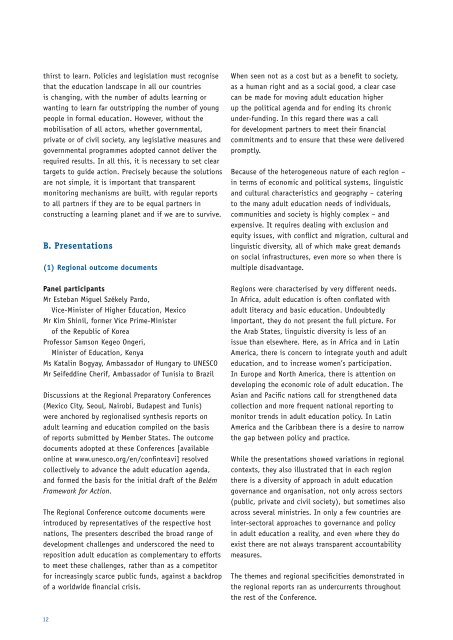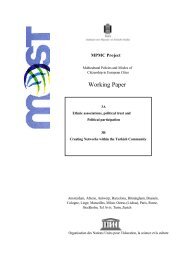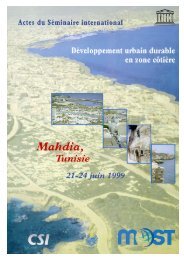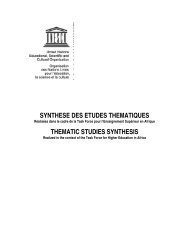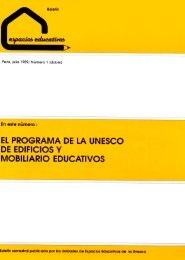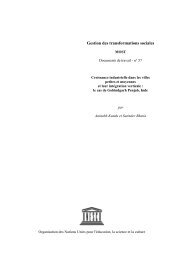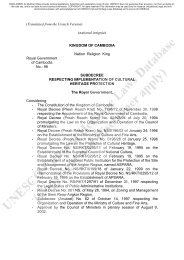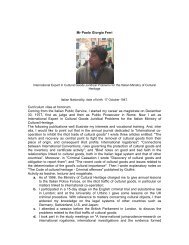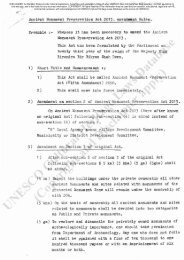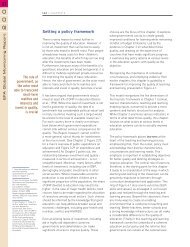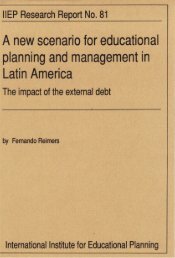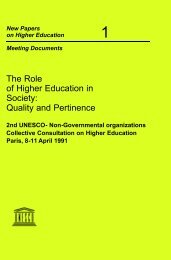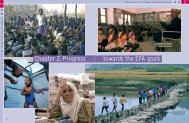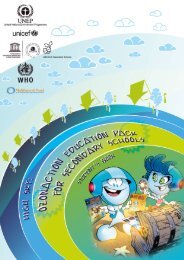CONFINTEA VI, final report - Unesco
CONFINTEA VI, final report - Unesco
CONFINTEA VI, final report - Unesco
Create successful ePaper yourself
Turn your PDF publications into a flip-book with our unique Google optimized e-Paper software.
thirst to learn. Policies and legislation must recognise<br />
that the education landscape in all our countries<br />
is changing, with the number of adults learning or<br />
wanting to learn far outstripping the number of young<br />
people in formal education. However, without the<br />
mobilisation of all actors, whether governmental,<br />
private or of civil society, any legislative measures and<br />
governmental programmes adopted cannot deliver the<br />
required results. In all this, it is necessary to set clear<br />
targets to guide action. Precisely because the solutions<br />
are not simple, it is important that transparent<br />
monitoring mechanisms are built, with regular <strong>report</strong>s<br />
to all partners if they are to be equal partners in<br />
constructing a learning planet and if we are to survive.<br />
B. Presentations<br />
(1) Regional outcome documents<br />
Panel participants<br />
Mr Esteban Miguel Székely Pardo,<br />
Vice-Minister of Higher Education, Mexico<br />
Mr Kim Shinil, former Vice Prime-Minister<br />
of the Republic of Korea<br />
Professor Samson Kegeo Ongeri,<br />
Minister of Education, Kenya<br />
Ms Katalin Bogyay, Ambassador of Hungary to UNESCO<br />
Mr Seifeddine Cherif, Ambassador of Tunisia to Brazil<br />
Discussions at the Regional Preparatory Conferences<br />
(Mexico City, Seoul, Nairobi, Budapest and Tunis)<br />
were anchored by regionalised synthesis <strong>report</strong>s on<br />
adult learning and education compiled on the basis<br />
of <strong>report</strong>s submitted by Member States. The outcome<br />
documents adopted at these Conferences [available<br />
online at www.unesco.org/en/confinteavi] resolved<br />
collectively to advance the adult education agenda,<br />
and formed the basis for the initial draft of the Belém<br />
Framework for Action.<br />
The Regional Conference outcome documents were<br />
introduced by representatives of the respective host<br />
nations, The presenters described the broad range of<br />
development challenges and underscored the need to<br />
reposition adult education as complementary to efforts<br />
to meet these challenges, rather than as a competitor<br />
for increasingly scarce public funds, against a backdrop<br />
of a worldwide financial crisis.<br />
12<br />
When seen not as a cost but as a benefit to society,<br />
as a human right and as a social good, a clear case<br />
can be made for moving adult education higher<br />
up the political agenda and for ending its chronic<br />
under-funding. In this regard there was a call<br />
for development partners to meet their financial<br />
commitments and to ensure that these were delivered<br />
promptly.<br />
Because of the heterogeneous nature of each region –<br />
in terms of economic and political systems, linguistic<br />
and cultural characteristics and geography – catering<br />
to the many adult education needs of individuals,<br />
communities and society is highly complex – and<br />
expensive. It requires dealing with exclusion and<br />
equity issues, with conflict and migration, cultural and<br />
linguistic diversity, all of which make great demands<br />
on social infrastructures, even more so when there is<br />
multiple disadvantage.<br />
Regions were characterised by very different needs.<br />
In Africa, adult education is often conflated with<br />
adult literacy and basic education. Undoubtedly<br />
important, they do not present the full picture. For<br />
the Arab States, linguistic diversity is less of an<br />
issue than elsewhere. Here, as in Africa and in Latin<br />
America, there is concern to integrate youth and adult<br />
education, and to increase women’s participation.<br />
In Europe and North America, there is attention on<br />
developing the economic role of adult education. The<br />
Asian and Pacific nations call for strengthened data<br />
collection and more frequent national <strong>report</strong>ing to<br />
monitor trends in adult education policy. In Latin<br />
America and the Caribbean there is a desire to narrow<br />
the gap between policy and practice.<br />
While the presentations showed variations in regional<br />
contexts, they also illustrated that in each region<br />
there is a diversity of approach in adult education<br />
governance and organisation, not only across sectors<br />
(public, private and civil society), but sometimes also<br />
across several ministries. In only a few countries are<br />
inter-sectoral approaches to governance and policy<br />
in adult education a reality, and even where they do<br />
exist there are not always transparent accountability<br />
measures.<br />
The themes and regional specificities demonstrated in<br />
the regional <strong>report</strong>s ran as undercurrents throughout<br />
the rest of the Conference.


